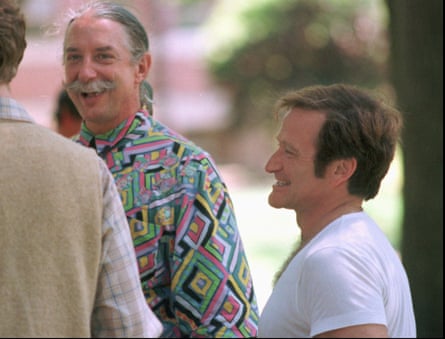I
In the movie Titanic directed by James Cameron, during the sinking of the ocean liner, First Officer William Murdoch resorted to using his gun as chaos erupted among passengers trying to secure a spot on the limited number of lifeboats. In a moment of panic, he fired into the crowd, fatally injuring an Irish worker named Tommy Ryan. In a moment of realization, Murdoch saluted his nearby colleague before taking his own life with the gun.
In 1997, when the popular movie was released, viewers were captivated by this intense scene. However, the small Scottish town of Dalbeattie, where the real-life Murdoch grew up, did not share the same enthusiasm. A plaque on the town hall still praises his “heroism,” but his family publicly denounced the movie’s portrayal of Murdoch. His nephew, Scott Murdoch, claimed that it was exaggerated to make the film more thrilling and that there was no proof that his uncle had committed any murders. The backlash was so strong that the executive vice president of 20th Century Fox traveled to Dalbeattie to apologize. As compensation for the distress caused, a check for £5,000 was given, and even director James Cameron expressed regret in the DVD commentary for Titanic, saying, “I now realize that portraying a specific person was probably a mistake.”

After 25 years, Hollywood has yet to resolve the ethical dilemma faced by Cameron when creating a film based on real individuals and events. Should filmmakers be accountable to the people whose lives are portrayed in their blockbuster movies? Is there a limit to how much they can sensationalize a story while still respecting the experiences of those involved, whether they are still living or not? Zach Baylin, the Academy Award-nominated writer of King Richard and the upcoming biopic One Love about Bob Marley, acknowledges that there has always been a conflict in Hollywood when it comes to biopics. This issue was recently brought to light again with the controversy surrounding Todd Haynes’ film May December.
The inspiration for May December came from the story of Mary Kay Letourneau, a former American teacher who was imprisoned in 1997 for engaging in sexual relations with her 12-year-old student, Vili Fualaau. After serving a six-year sentence, the couple got married and had two children. The film fictionalizes many aspects of their marriage, including the addition of Natalie Portman as Elizabeth Berry, an actress set to play the lead in a movie based on their lives. As screenwriter Samy Burch stated, the film is loosely based on their story, similar to how the show Succession is inspired by real-life events. However, Vili Fualaau, the real person behind the story, expressed his disappointment with the project, stating that it lacked respect for his experience and still ongoing life. He shared his thoughts with the Hollywood Reporter earlier this month.
Fualaau is not the only one expressing criticism towards a film based on his family’s life during this awards season. According to reports, Lisa Marie Presley expressed to Sofia Coppola that she found the script for her latest film, Priscilla, to be “shockingly vengeful and contemptuous” and portrayed Elvis Presley as a “predator”. Similarly, Charles Oppenheimer, grandson of the famous nuclear physicist depicted in Christopher Nolan’s Golden Globe-winning drama, recently shared his discomfort with the film for including a scene where the scientist attempts to poison a tutor with a potassium-cyanide-laced apple. According to Oppenheimer, this scene is historically inaccurate and a serious accusation, as it was never mentioned by anyone who knew Robert Oppenheimer during his lifetime.
Ignore advertisement for newsletter.
after newsletter promotion
In an interview with the Guardian, Oppenheimer, who was in communication with Nolan during the film’s production but was not directly involved, expresses satisfaction with the overall product. He believes it is a valuable piece of art that can serve as a starting point for understanding who Robert Oppenheimer was. Additionally, he is pleased with the attention the film has brought to his non-profit organization, The Oppenheimer Project, which aims to promote nuclear energy and reduce nuclear weapons. However, he also suggests that it would be beneficial if Hollywood included family members in the process, as it can feel disconnected and exploitative otherwise.
There have been previous instances of similar controversies. The 2018 Oscar-winning film Green Book received backlash from the family of its subject, Dr. Don Shirley. They claimed that the movie misrepresented the relationship between the highly regarded Black pianist and his chauffeur. Similarly, filmmaker Quentin Tarantino faced public criticism from Bruce Lee’s family following the release of his 2019 film Once Upon a Time… in Hollywood. Lee’s daughter, Shannon, expressed concern over the portrayal of her father in a “troubling” manner. Tarantino responded rudely, maintaining his belief that “Bruce Lee was kind of an arrogant guy” and telling those who were bothered to “go suck a dick.”

If you go back further in Hollywood’s past, you will find even more controversial examples. Hunter Doherty “Patch” Adams, an American physician and advocate, was famously portrayed by Robin Williams in a 1998 film based on his life. Adams has dedicated his life to promoting a radical new approach to healthcare that is free for patients. However, the movie portrayed him as simply a funny doctor, leaving the now 78-year-old feeling embarrassed. He agreed to the film because he hoped it would help him build a hospital, but instead he felt misrepresented. As Adams explained in 2012, “Movies are made to sell tickets. Love, peace, and justice don’t sell tickets. Funny does. So people watch the movie and say, ‘Patch! Funny doctor.’ Not a doctor who wants to change the capitalist system.”
According to Baylin, there is no universal rule for how much respect biopics should show towards their subjects. For instance, the film The Social Network from 2010, which was criticized by its subject Mark Zuckerberg for being hurtful, is very different from the controversy surrounding Green Book. The former addressed important cultural issues related to the sexist roots of modern Silicon Valley, while the latter upset a regular family by using their relative’s name to tell a pleasant, distorted story about race in America. When creating his own biopics, Baylin prefers to collaborate closely with his subjects and/or their families.

According to the speaker, having the trust and cooperation of the individuals involved can greatly benefit a project, as it allows for unique insights into their relationships and circumstances that cannot be obtained through historical records. However, there is also a sense of wanting to protect the image of their loved ones and how they are portrayed to the public. This can lead to a negotiation between accurately representing the film and respecting the family’s wishes. Overall, the speaker believes that involving the subjects in the film-making process results in a better end product.
Many others also prefer this approach. Films such as Bradley Cooper’s Maestro, JA Bayona’s Society of the Snow, and Ava DuVernay’s Origin are expected to be featured in this year’s awards season. These films were created with close collaboration from their subjects or families, indicating a potential shift in Hollywood’s approach to portraying real stories without exploitation. Some may argue that it’s about time for this change. Cinema has a tendency to solidify perceptions that are hard to change. As William Murdoch’s nephew expressed after 20th Century Fox’s apology in Dalbeattie: “In a few years, people will forget about this event, but the film will continue to depict my uncle as a murderer.” The question of what filmmakers owe to their real-life inspirations, to quote Titanic’s theme song, will likely continue to be debated.
Source: theguardian.com


